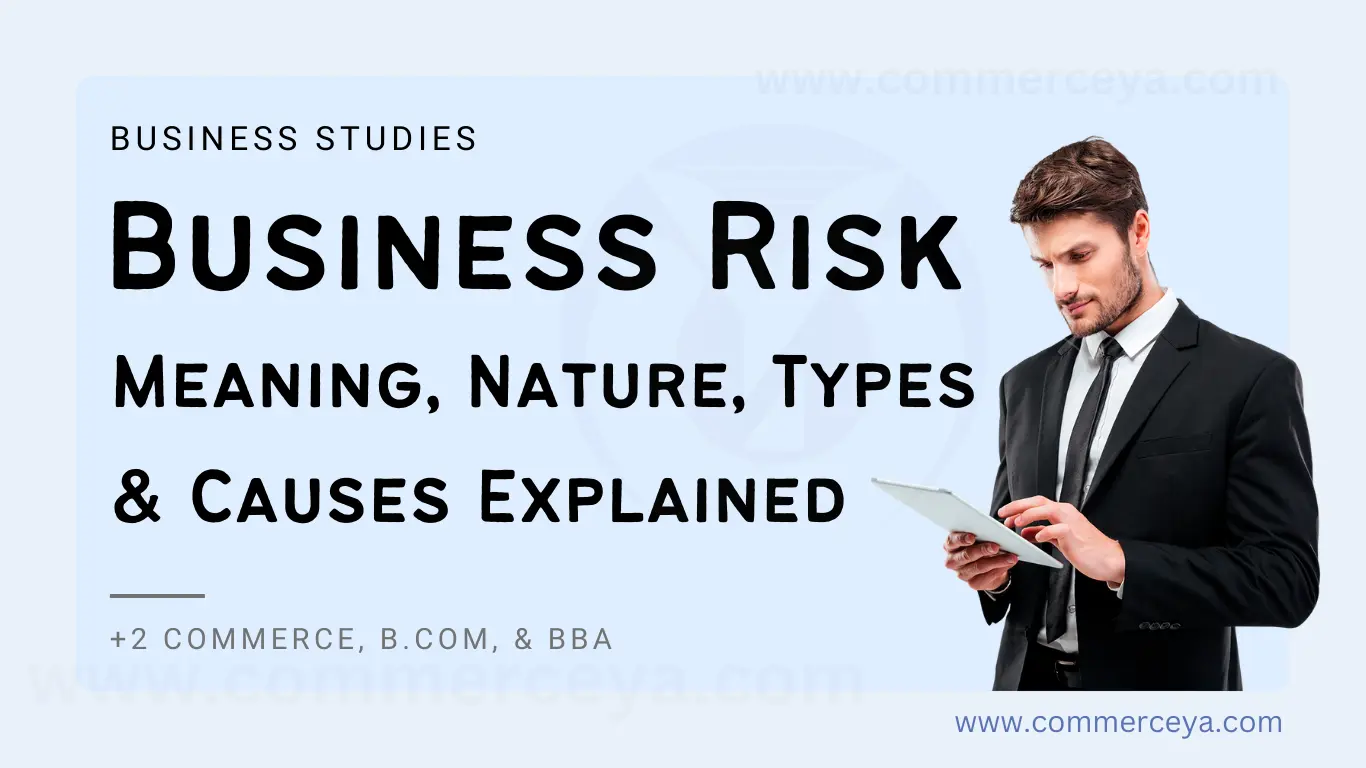The Business Risk: Meaning
There are always risks in business. Economic, natural, physical, and human factors cause several risks that surround business units. A businessman has to make some assumptions about the future and base all his decisions on those predictions. Many factors can influence future circumstances, and a change in any situation may bring the risk element into play. The uncertainties of the future create situations where business risks arise. Every businessman tries to control or minimize the risks, but they cannot be entirely avoided.
The common business risks include the following:
- A fall in income or financial loss
- Breakdown of plants and machinery
- Non-availability of raw materials, power, labor, capital, etc.
- Changes in the prices of products due to different reasons
- Effects of the entry of new competitors
- Loss of goodwill
- Change of government policy towards business
Nature of Business Risks
The uncertainties of the future bring risks. Risk is inherent in every type of business. Some risks may be foreseen and insured, while others may not be predictable and cannot be insured.
The nature of business risk can be described as follows:
- Business risks arise due to uncertainty
- Risk is an essential part of business
- The degree of risk depends primarily on the nature and size of business
- Risk and Reward
- Business risks arise due to uncertainty. A businessman tries to plan activities based on future predictions. The future is always uncertain, and the assumptions on which business decisions are based may not prove correct. The uncertainties may arise due to changes in demand, changes in consumer preference, government policy, economic factors, the vagaries of nature, etc. All such uncertainties bring risks to business.
- Risk is an essential part of business. Risk is an essential characteristic of business. Every business has some risk. Risk cannot be entirely avoided, but it can be reduced. Proper planning and forecasting of various factors may minimize the risk.
- The degree of risk depends primarily on the nature and size of the business. The degree of risk is linked to the nature and size of a business. For example, a person dealing in fashion items has more risk because changes in consumer preferences are frequent for such items. A person dealing in standardized goods will face less risk because demand is generally stable. Large businesses face more risks as compared to smaller businesses.
- Risk and Reward: It is generally said that the greater the risk, the greater the profit. A businessman faces future uncertainties. If he is not prepared to take the risk, then he will not get proper rewards either. To earn more, one should also be prepared to lose. In a competitive world, as we see today, one has to spend a lot on advertising the products, conducting marketing research, and incurring many more expenses. If the product is well received, he will benefit; otherwise, he will face losses. One has to take risks to gain more.
Causes of Business Risks
Business risks arise for a variety of reasons, which may be classified as follows:
- Natural causes
- Human causes
- Economic causes
- Physical causes
- Political causes
- Natural causes: Natural causes are beyond the control of human beings, and these factors cause business losses both directly and indirectly. Natural causes of risk may be climatic changes, earthquakes, heavy rains, and loss of life and property due to fire.
- Human causes: The human factor is the most important cause of business risks. There may be carelessness, misunderstandings, wrong estimations, and ill intentions. dishonesty or miscalculations on the part of human beings. Human causes also include stoppage of work due to power failure, strikes, riots, management inefficiency, etc. Better human resource management may help reduce business risks due to human factors.
- Economic causes: Economic causes are related to a chance of loss due to changes in market conditions. The change in economic conditions influences business activities such as price levels, demand situations, the supply of capital, etc. A period of recession may slow down industrial activity, and an inflationary situation may lead to rising costs. Other economic causes may be fluctuations in demand, more competition, wage rises, an inadequate supply of raw materials, etc. All these factors lead to business risks.
- Physical causes: There may be technical, mechanical, or other reasons that may become the cause of risks. There may be mechanical failures in machines that may cause damage or loss; there may be depreciation in machines due to the passage of time or wear and tear. The advancement in technology may render old machines obsolete. The lack of care in maintaining machines and other equipment may lead to frequent breakdowns and accidents, which pose business risks.
- Political causes: Political causes arise due to unstable government policies and the ideology of the ruling party. A government may adopt some policies that may adversely affect business. For example, the Janata Party government forced the closure of the Coca-Cola business in India, and Indira Gandhi nationalized all the leading private sector banks.
Types of Business Risks
Business risks can be of the following types:
- Insurable risks
- Non-insurable risk
- Insurable risks: These are the risks that can be recovered after getting them insured. When the insurance company insurances some risks, in the event of a loss, the firm will get compensation from the company. Generally, natural and physical causes are insurable risks. A businessman can take out an insurance policy to cover losses due to fire, theft, earthquakes, floods, etc. In the event of a loss due to insured causes, the insurance company will compensate the insured for the loss.
- Non-insurable risks: There is no protection available against non-insurable risks. Generally, economic and human risks are non-insurable. A businessman cannot get compensation if sales go down due to competition or a lack of demand. Similarly, losses caused by human negligence cannot be insured.




